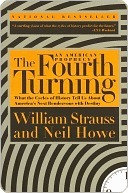More on this book
Community
Kindle Notes & Highlights
Read between
August 13 - December 8, 2018
Family order strengthens, and personal violence and substance abuse decline. Those who persist in free-wheeling self-oriented behavior now face implacable public stigma, even punishment.
The risk of revolution is high—as is the risk of civil war, since the community that commands the greatest loyalty does not necessarily coincide with political (or geographic) boundaries.
a catalytic agent is a reaction enabler, an ingredient that lowers the energy threshold required to produce a chain reaction.
“It's always the good men who do the most harm in the world.”
Start with a winner-take-all ethos that believes in action for action's sake, exalts strength, elevates impulse, and holds weakness and compassion in contempt. Add class desperation, antirationalism, and perceptions of national decline. The product, at its most extreme, could be a new American fascism.
To every thing there is a season, and a time to every purpose under the heaven. In each of the four seasons of life and nature, there are things a person should and should not do.
An Unraveling is an era when most people of intelligence, vision, and integrity do not seek (much less get elected to) high public offices.
when a Crisis catalyzes, a previously dominant political party (or regime) can find itself directly blamed for perceived “mistakes” that led to the national emergency.
craft a new rhetoric of public purpose that emphasizes collective duties over personal rights.
if your business is perceived as predatory, your profession as parasitical, or your influence as corrupting, then you will personally be at risk.
Societies that deify history's destination typically have no respect for the moral autonomy of the people making the journey.
Nietzsche believed that delusions about never-ending progress toward an unattainable standard had become a root malady of the Western psyche.
Zarathustra, identifies the problem as “the spirit of revenge” against “time and its ‘It was’”—meaning a resentment against history itself, against a one-way pilgrimage whose lofty goals keep proving mankind's actual condition to be one of contemptible insignificance.
Zarathustra teaches the doctrine that every event is perpetually reenacted, that everything anyone does has been done before and will be done again forever. Every act therefore becomes an end in itself as well as a means to an end. Zarathustra calls this “the eternal return,” the opportunity afforded everyone to share fully in what it means to be a human being.


